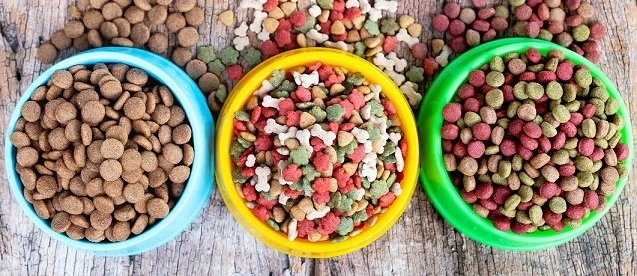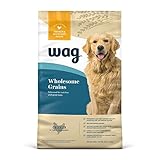Dog food is food specifically prepared to meet the physiological needs of dogs and other similar animals. It can be industrial (dry or semi-moist) or natural (raw or cooked). Dogs are ancestrally carnivorous animals.
They have sharp, pointy teeth for tearing meat and crushing bone, and a much shorter gastrointestinal tract than that of herbivores, designed for the digestion of meat (which does not need fermentation ).
Why is dog feed important?
All of us need a pet from time to time and we want to keep the pet healthy & energetic. If you are thinking about buying a dog, then it is always beneficial to know the types of foods that you should include in your diet for this type of animal.
Basic principles of feeding
Species-appropriate feeding –
The domestic dog, like the wolf from which it descends, belongs to the dogs and thus to the order of predatory animals, the Carnivora. But even the carnivores among the “predators” do not feed on meat but on prey. Depending on what is available, the wolf also eats plant material and its digestive system is able to adapt to different types of food within certain limits.
In the course of living with humans, dogs had to adapt to their food sources and thus became functional omnivores. Genetic studies comparing wolves and dogs suggest that dogs, like humans, have adapted to starchy foods over the course of domestication .
Age-Appropriate Feeding –
Each stage of a dog’s life makes different demands on the dog food. A range of different compositions is available on the market, from puppy food to junior and adult food (adult) to special food for older dogs (seniors).
Needs-based feeding
In addition to the phase of life, when it comes to dog food, the requirements of the dog and how active it is (breeding dog, working and sporting dog, sled dog, pregnancy/ lactation ) must also be taken into account.
Breed-typical aspects play a role here. The dog food can be tailored to the special needs of certain dog sizes, such as dog food for small, medium, and large breeds, or special breeds such as Golden Retrievers, Jack Russell Terriers, German Boxers, German Shepherds, which are prone to certain diseases, for example.
Disease-Related Feeding
Many dog diseases are associated with metabolic disorders of the entire organism or individual organs, which require special feeding principles. There are also certain diseases, such as obesity (obesity), which are caused by incorrect feeding.
As part of dietetics, feeding is intended to help alleviate symptoms of the disease or to make them abnormal with prophylactic intent. Dietary z. B. obesity, liver and kidney diseases, and urinary stones.
Commercial products are also increasingly being offered here. [20] The term “diet food” is in Section 2 of the Feed Ordinance regulated by law to prevent abuse. There is also a wide range of various other dietary supplements .
Hypoallergenic feeding
Special feeding is indicated in the event of a feed allergy or feed intolerance. While a feed intolerance is an abnormal reaction to an ingested feed or a feed additive, the feed allergy has an immunological cause.
An elimination diet designed to avoid the triggering allergens is required. Several companies offer commercial products based on rarely fed protein sources (eg, lamb or duck ); alternatively, a homemade ration can be put together.
How to Get Rid of Health Issues?
This will help you prevent health issues. As we all know food is one of the essentials. It provides energy and nutrients for your body. Therefore, good quality dietary habits are essential for our pets as well.
Some types of foods for dogs
The following list describes various types of foods for dogs. You can also prepare these recipes yourself by combining different types of ingredients and adding various flavors. So read on!
Dogs eat mostly dry kibble or pellets made up of fresh beef bones and other animal parts. They are easily digestible and high-energy diets, so they are excellent for boosting exercise and boosting immune function.
The best choice of food for dogs is their main diet, but they can sometimes get hungry in between meals which is why some people choose mixed food for them. However, for most, it is better to have a consistent food pattern s n.
A typical dog’s main eating habit will be kibble. Kibble is an easy-to-use and tasty way to feed their kiddos. But don’t let the name fool you, kibbles are not just for children! It is actually great for small-breed dogs, too.
These tiny furry creatures will prefer to nosh on the kibble instead of any other kind of protein or fat in their meal. If you want to give your pooch a special treat like chocolate, peanut butter, etc., try adding peanut butter to its kibble.
If you don’t think you will like it, you can do something else with it, such as mixing it in another kibble-based dish. Mixing kibbles together makes it easier for owners to make sure their dogs get the right amount of food each day. Here is how to mix kibbles:
The first step is to determine the number of servings of kibble to feed your feline friend. Then divide that into six portions according to weight and you will know how much they should be eating on each day.
Always remember to write down two things – how many calories a serving contains and the quantity you want to serve. When your pooch eats those portions, count it off again. It will help them remember what is being given to them and avoid overeating.
With this approach, you will be able to figure out the correct amount of food for your pet. After dividing up these quantities, you are ready to start feeding them kibble of your own. Your job is done! Enjoy your delicious and nutritious homemade treats while protecting your precious dog from harmful bacteria and germs.
Pros and Cons of Vegetarian food for dogs
Vegetarian food for dogs is a healthier opt
ion when choosing food.
- COMPLETELY PLANT-BASED – We proudly provide your dog with a delicious meat alternative that’s protein-rich, made with a completely plant-based recipe, and is nutritionally balanced for daily feeding to adult dogs
Details
Brand Halo Purely For Pets
Flavour Vegetable
Age Range Description Adult
Target Species Dog
Item Form Wet
- Their main sources of energy come from amino acids present in meats like chicken and meat products like beef, pork and lamb. In most cases, dogs require more calories, especially protein that comes from vegetables. So, if you do not want to worry about excess fats and saturated fats, then try making vegetarian food for dogs.
- Best food for French Bulldogs
- Best food for Boxers
Some vegetables for dogs
Some common vegetables for dogs include peas, carrots, onions, broccoli, spinach, garlic, tomatoes, cucumbers, celery, and leeks. They do not have much protein but they can still provide a lot of useful nutrients like carotenoids and vitamin C.
To give them a boost in immunity, you can add spices like ginger, lemon, honey, and chili powder to their vegetable meals. Some vegetables can be eaten raw and others cooked. Make sure that you put enough water in their food to keep them hydrated and nourished.
Try using low-fat yogurt, whey protein, and eggs to provide extra protein for your furry friends. And don’t forget to sprinkle your pup with chutneys like basil, mustard seeds, and coriander for added flavor.
Why are dogs so sensitive to food allergies?
Good nutrition helps with overall health and vitality and maintains good skin, coat, and hair quality. There are three main reasons why you need proper nutritional foods for your pet.
To start off, it is an essential part of the process of rearing a healthy dog. A well-balanced diet will support their immune system, help maintain normal body weight, and improve digestive health. It can also help prevent some diseases and can help control the development of cancer.
What Makes Me Feed My Dog?
There are many ways that you can incorporate nutritious foods for your dog. For instance, if you’re going to choose dry dog food, make sure that you purchase appropriate-size pouches that have enough calories for a puppy’s daily needs and that they’re made without grains, wheat, corn, or soy. If you want to supplement your dog’s meals with protein, you can try adding chicken, beef, tuna, or fish.
Try not to give them any animal meat products as this could increase the risk of obesity. You can avoid feeding canned/raw meats because they contain high levels of sodium. The only exception to this rule would be raw carrots and celery; in this case, you could use them in place of raw meat but keep it light.
On the whole, we recommend eating plenty of fresh fruits and vegetables too. Your dog needs nutrients for good health and this includes protein and carbohydrates. Make sure that you don’t add artificial ingredients such as nitrates, phosphates, preservatives, and flavorings.
Avoid giving any vitamins unless specifically required and note that over-feeding can lead to nutrient deficiencies and increased risks of illness.
Additionally, you can always mix up cooked pet food with wet dog food to get the benefits while still having something tasty on hand. Finally, consider using homemade treats too! Our recipes are easy to prepare and you can store leftovers in the freezer for later when you forget what you’re having.
What Do the Nutrition Labels Of Pet Food Say?
It’s very important to know exactly how much food your furry friend requires to remain healthy and happy.
When researching pet food, it’s typically recommended that your child is fed no more than 14 percent of their energy intake (about 3500 calories). That means that you should never feed your pup less than 500 calories per day. Since most pet foods are formulated with a lower degree of natural protein content, especially compared to chicken or other higher protein sources, it often makes sense to cut back on amounts to meet your pet’s needs.
Why Are Dogs So Sensitive?
As we mentioned before, one reason that dogs are susceptible to illnesses is due to being naturally lactose intolerant. Lactase is found in milk and it breaks down lactose (or galactose) during digestion.
While it might sound odd for a non-lactose fermenting herbivore to be sensitive to galactose, the truth is that the protein they digest in milk doesn’t match the protein they receive from plant foods. In order to combat this issue, some experts suggest switching to dairy-free or milky products to reduce intolerance.
It’s always a good idea to talk to your vet about the best foods for your pooch as well as how to address other issues such as diabetes, kidney disease, arthritis, and even seizures. Don’t just assume that they must be allergic to anything without consulting your pet’s doctor first! Here are some additional ideas to help you out in the kitchen!
What is the Best Soft Dog Food For Dogs With No Teeth (Or Few/Bad Teeth)?
Dietary changes can impact dental hygiene as well, so if you’re considering a change, it is essential to discuss it with your vet first. Just like humans, dogs also need an optimal oral care routine to maintain a healthy mouth and gums. As long as you avoid overly harsh tooth-brushing practices, you can take steps to make your canine smile! Luckily, there is really nothing that can hurt your dog’s teeth more than biting something hard.
Use soft, chewy toys or chewable lollipops to make chewing easy and fun. Keep on track with your pets’ regular dental health checks to confirm that your furry friend isn’t suffering from any problems.
And don’t forget special diets for small, delicate mouths! You don’t have to make them suffer! Simply make sure that they eat at least two times a day (or more for extra large breeds) and avoid giving any supplements containing zinc and garlic. Other good choices are yogurt, cheese, cottage cheese, or even peanut butter to help with teeth’ enamel.
Which is The Best Food for Dry Skin?
Dogs are naturally prone to excessive shedding! Therefore, it’s crucial to feed your four-legged buddy a balanced diet full of antioxidants and omega fatty acids like Omega 3’s that protect your dog’s skin from damage caused by UV rays.
These acids help to slow the aging process and help strengthen skin structure. You can feed them topical vitamin E supplements to protect the skin from sun damage if necessary.
Lastly, if you suspect your cat or kitty’s fur is damaged from improper grooming, treat them accordingly.
- Real Meat First: Cage-free American chicken is the #1 ingredient; protein helps keep your dog at his bounding best
- No added chicken by-product meal, corn, wheat, soy, artificial colors, flavors, or preservatives
Details
Brand WAG
Flavor Chicken
Target Species Dog
Item Form Pellet
Specific Uses for Product Brain, Dental Health, Immune System, Bones, Joints
One ingredient worth mentioning here is keratin, which is one of nature’s key building blocks. Keratin can be combined with other anti-aging proteins to produce the perfect formula to satisfy your dog’s needs.
Related Posts





